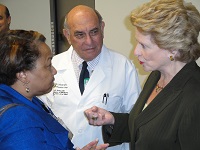
Michigan's senior U.S. senator, Debbie Stabenow, spoke to an overflow audience of students and faculty about the importance of mental health care parity at the Wayne State University School of Medicine on Monday.
Stabenow's appearance was made possible by the school's Medicine and Political Action in the Community organization, designed to support the involvement of WSU medical students interested in political issues. The senator's talk was the first for the new academic year for MPAC, and drew the largest audience of any lecture to date.
The longtime Democrat, spoke of her work to bring to fruition the Excellence in Mental Health Act, which included reaching across the aisle to Sen. Roy Blunt (R-Mo.), to begin building a national coalition of more than 50 organizations. That coalition included veterans of Iraq and Afghanistan organizations and law enforcement groups that recognized the need because of the number of mentally ill people housed in jails because of a lack of mental health facilities.
She had unsuccessfully tried to pass through Congress similar legislation earlier. But in the wake of a series of mass shootings in the last few years, when gun rights activists and legislators said such incidents were the result of mental health issues, Stabenow resurrected her bill, using that very argument to bolster support for the act.
Under the act, Congress has allocated $1 billion in funding for pilot mental health programs in eight states to be selected this fall. The Department of Health and Human Services will decide which eight states receive the funding, based on a number of quality requirements, including the availability of a 24-hour psychiatric center. The decision will spread the program among diverse states to better assess the success of the programs. To date, 25 states have applied for planning grants to assess their mental health needs, the first step before the final states are selected.
Stabenow noted that one in four Americans will be affected by mental illness. She shared that her interest in mental health parity is one of fairness, but one that also affected her family. While she was in middle school, her father developed a mental illness that today would be diagnosed as bipolar disorder. While he was never aggressive, he was "in and out" of hospitals for years because of the condition until the advent of lithium as a treatment. After that, she said, he was able to lead a regular life.
"We need to accept and treat disease above the neck just as we accept and treat diseases below the neck," she said.
In answer to a question about a federal freeze on the number of medical residency slots in the face of larger medical school classes and additional medical schools, Stabenow said the nation needs more graduate medical education positions. "The nation needs more physicians, more health care workers. With the Affordable Care Act, we are insuring more people, so we need more physicians and more health care workers. You need to make yourselves heard with your representatives about graduate medical education."
Stabenow noted that there is a "wholesale attack" on health care in Congress, beginning with yet another attempt to repeal the Affordable Care Act, proposals to reduce funding for medical research, and cuts in Medicare and Medicaid. "We are one president away from those cuts," she advised.
"Whether you pay attention to politics or get involved or not, the fact is, you will be impacted by politics," she told students. "You don't have a choice about whether you will be impacted. You will. Your choice is to pay attention, participate and engage. You can make change happen."